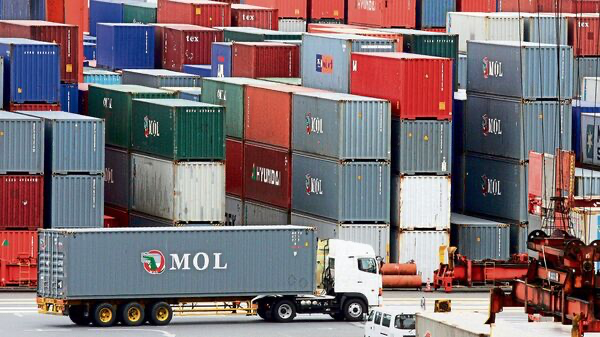SACU

Disclaimer: Copyright infringement not intended.
Context
India's efforts to boost its declining merchandise exports by focusing on a trade deal with the Southern African Customs Union (SACU).
Details
- India focuses on striking a trade deal with SACU amid declining merchandise exports due to demand slowdown in the west.
- SACU is a resource-rich customs union consisting of Botswana, Eswatini, Lesotho, Namibia, and South Africa.
- The potential India-SACU preferential trade agreement has undergone five rounds of negotiations since 2007.
Rationale for Trade Diversification
- Trade experts emphasize the need for export diversification as 40% of India's export orders come from only seven countries, making it susceptible to external shocks.
- Currently, the US and Europe constitute nearly one-third of India's merchandise exports, driving outbound shipments in the past decade.
Progress in India-SACU Trade Talks
- Talks between India and SACU have made progress, with both sides agreeing to revive negotiations in 2020.
- SACU being a developing country union simplifies negotiations as non-trade issues like labor, gender, and environment are less likely to pose challenges.
Potential Areas of Trade Benefits
- Complementarity exists between India and South Africa, with India importing coal, diamonds, gold, and iron ore.
- There are opportunities for growth in the pharmaceutical, iron, and steel sectors, along with a need to address the trade balance.
- The automobile sector offers potential gains, with South Africa being the leading exporter of passenger automobiles among India's key markets.
Current Trade Scenario and Challenges
- Indian exports have declined for the fourth consecutive month, with goods exports falling by 10.30% in May 2023 compared to the previous year.
- Imports also declined by 6.57% in the same period, leading to a trade deficit of $22.12 billion, the highest in over five months.
- Global demand slowdown and declining international crude prices have impacted petroleum exports, which were a major driving force.
- South Africa has experienced a sharp deceleration in growth due to policy tightening and an intensifying energy crisis, including frequent power outages.
- Inflation has remained above the upper bound of the central bank's target range, leading to further policy tightening in the country.
About SACU
- The Southern African Customs Union (SACU) is a regional trade bloc consisting of five countries in Southern Africa.
- Established in 1910, SACU aims to promote economic integration, facilitate trade, and foster cooperation among its member states.
Objectives
- SACU aims to create a common customs territory among its member countries, promoting free trade and removing barriers to the movement of goods and services within the union.
- The union seeks to coordinate trade policies, harmonize customs procedures, and promote cooperation in various economic sectors to enhance regional integration.
Member Countries
- SACU comprises five member countries: Botswana, Eswatini (formerly Swaziland), Lesotho, Namibia, and South Africa.
- These countries share a common customs area and operate under a common external tariff, which means they apply the same import duties on goods from non-member countries.
Trade and Economic Integration
- SACU facilitates intra-regional trade by eliminating customs duties and trade restrictions among member countries, creating a seamless market for goods and services.
- The union promotes economic integration by encouraging investment flows, enhancing market access, and fostering cooperation in sectors such as agriculture, manufacturing, and services.
Common External Tariff (CET)
- SACU operates under a common external tariff, which means that member countries apply the same import duties on goods imported from outside the union.
- The CET is designed to protect SACU industries, promote regional manufacturing, and generate revenue for member countries through customs duties.
Revenue Sharing
- SACU implements a revenue-sharing arrangement to distribute customs and excise duties collected at the common external border among its member countries.
- This arrangement aims to address economic disparities among member states, providing financial support to less economically developed countries within the union.
Trade Relations with Other Countries
- SACU engages in trade negotiations with other countries and regional blocs to promote trade cooperation and expand market access for its member states.
- The union has signed several preferential trade agreements with countries and blocs such as the European Union (EU), the United States, and the Southern African Development Community (SADC).
Challenges and Future Directions
- SACU faces challenges in achieving balanced economic development among its member countries, addressing trade imbalances, and diversifying their economies beyond primary commodities.
- The union aims to enhance regional industrialization, promote value addition, and strengthen intra-regional supply chains to drive sustainable economic growth and development.
Imports from Southern Africa by India
Imports from Southern Africa play a significant role in India's trade relations. This region, comprising countries such as Botswana, Eswatini, Lesotho, Namibia, and South Africa, provides valuable resources and commodities to meet India's diverse import requirements. The following points highlight the key imports from Southern Africa by India.
Commodities Import
- India imports various commodities from Southern Africa, including coal, diamonds, gold, and iron ore. These resources are essential for India's industries and contribute to the country's economic growth.
- Coal imports from South Africa, in particular, play a crucial role in meeting India's energy demands.
Mineral Resources
- Southern Africa is known for its abundant mineral resources, and India relies on imports from this region to fulfill its mineral requirements.
- Imports of minerals like copper, manganese, and platinum from Southern Africa are essential for various industries, including manufacturing, construction, and automobile sectors.
Agricultural Products
- Southern Africa also serves as a source of agricultural products for India. Countries like South Africa and Namibia are known for their agricultural exports, which cater to India's food and livestock feed requirements.
- Importing agricultural products from Southern Africa ensures a diverse and stable supply of food and raw materials for the Indian market.
Raw Materials for Industries
- India's industries heavily rely on imports from Southern Africa for raw materials such as aluminum, steel, and other base metals.
- These raw materials are crucial for manufacturing processes and contribute to India's industrial development.
Automotive Components
- Southern Africa, particularly South Africa, is known for its automotive industry. India imports automotive components and spare parts from this region to support its own automobile manufacturing sector.
- Importing automotive components from Southern Africa ensures a steady supply of quality components and supports India's automobile production.
Machinery and Equipment
- Southern Africa also serves as a source of machinery and equipment for various sectors in India, including mining, agriculture, and manufacturing.
- Imports of machinery and equipment from this region enable technological advancements and enhance India's industrial capabilities.
|
PRACTICE QUESTION Q) Consider the following statements about Southern African Customs Union: 1. It was established in 1910 to promote economic integration, facilitate trade, and foster cooperation among its member states. 2. Botswana is not a member of SACU. Select the correct statements using the codes below: (a) 1 only (b) 2 only (c) Both 1 and 2 (d) Neither 1 nor 2 Answer: A |
https://www.livemint.com/economy/india-plans-to-revive-trade-deal-with-sacu-11687714447661.html





1.png)
